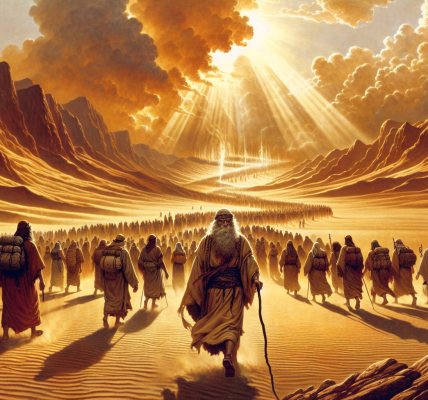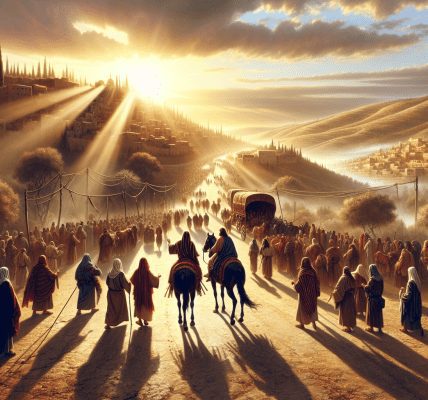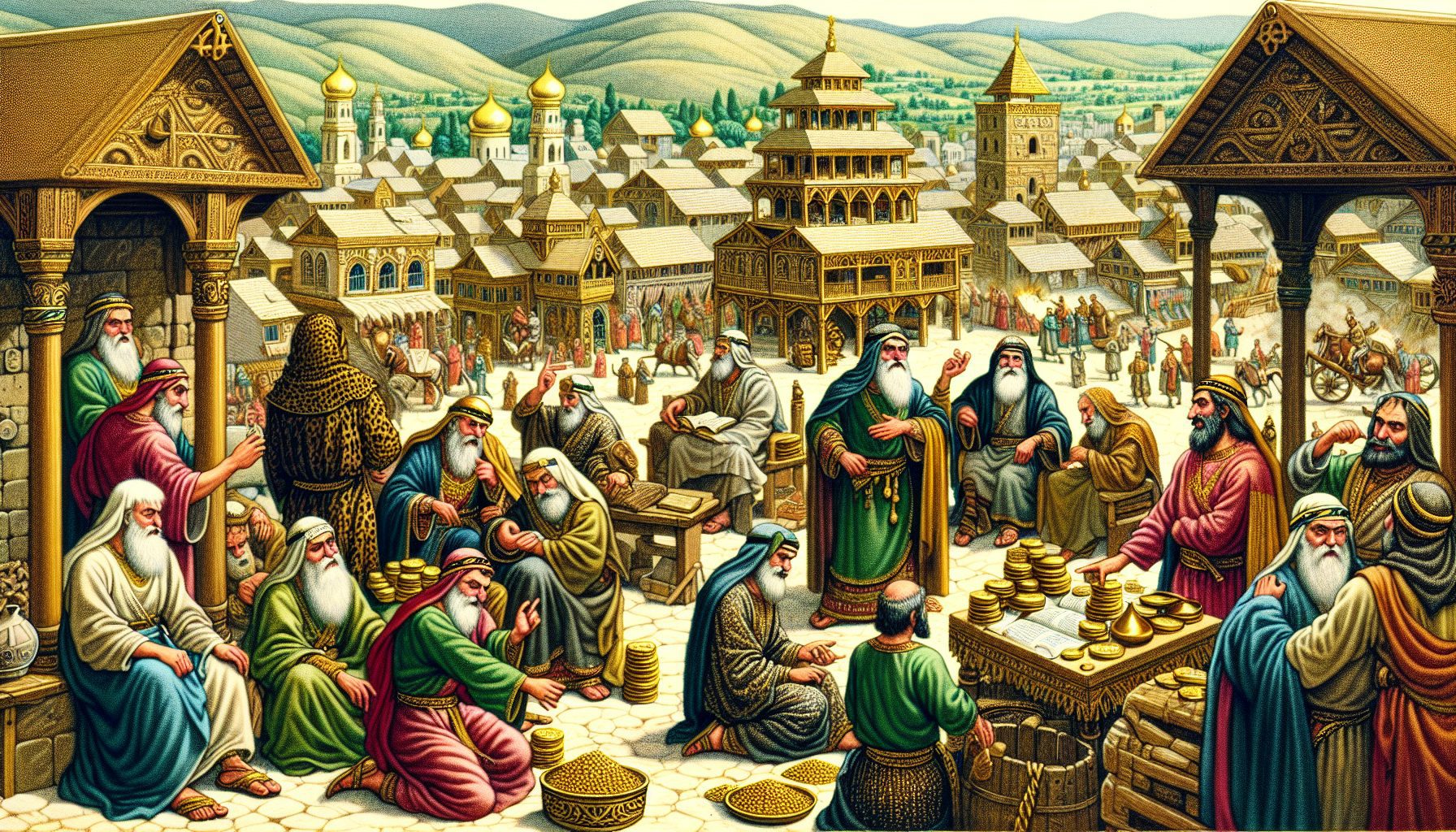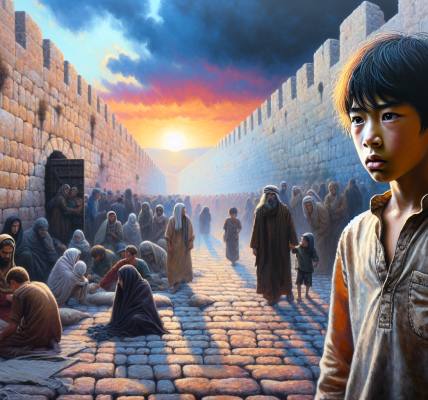**The Boldness of Paul and Barnabas in Lystra and Derbe**
The sun rose over the rugged hills of Lystra, casting a golden glow across the small Lycaonian city. The air was crisp, and the streets began to stir with life as merchants set up their stalls and farmers brought their goods to market. Among the bustling crowd, two men walked with purpose. Their robes were dusty from travel, and their faces bore the marks of both hardship and determination. These were Paul and Barnabas, apostles of the Lord Jesus Christ, sent to proclaim the Good News to the ends of the earth.
The two had come to Lystra after being driven out of Iconium, where they had faced fierce opposition from both Jews and Gentiles. Yet, their spirits were undeterred. They knew that the Gospel was a message of hope, and they were resolved to share it, no matter the cost. As they entered the city, they noticed a man sitting by the roadside. His legs were crippled from birth, and his eyes held a mixture of despair and longing. He had never walked, never run, never felt the ground beneath his feet. Day after day, he sat there, begging for alms, his life defined by his infirmity.
Paul, moved by the Holy Spirit, fixed his gaze on the man. He saw not just a crippled body but a soul in need of healing. “Stand up on your feet!” Paul commanded, his voice filled with authority and faith. The man, startled by the boldness of the command, looked up at Paul. In that moment, something extraordinary happened. Strength surged through his legs, muscles that had never worked before now responded, and he leaped to his feet. For the first time in his life, he stood tall. The crowd gasped in amazement as the man began to walk, then run, then jump, praising God with every step.
The people of Lystra were astounded. They had never seen such a miracle. In their culture, the gods were distant and capricious, demanding sacrifices but rarely intervening in human affairs. To them, this miracle could only mean one thing: the gods had come down to them in human form. They began to shout in their native Lycaonian language, “The gods have come down to us in human form!” They identified Barnabas as Zeus, the king of the gods, and Paul as Hermes, the messenger god, because he was the chief speaker.
The priest of Zeus, whose temple was just outside the city, brought oxen and garlands to the city gates, intending to offer sacrifices to Paul and Barnabas. The apostles, however, were horrified. They tore their clothes, a sign of deep distress and mourning, and rushed into the crowd, crying out, “Men, why are you doing this? We are only human, like you! We are bringing you good news, telling you to turn from these worthless things to the living God, who made the heavens and the earth and the sea and everything in them.”
Paul seized the moment to preach the Gospel. “In the past, God let all nations go their own way,” he declared. “Yet He has not left Himself without testimony: He has shown kindness by giving you rain from heaven and crops in their seasons; He provides you with plenty of food and fills your hearts with joy.” The crowd listened intently, but their initial excitement began to wane. The idea of a single, invisible God who demanded repentance and faith was foreign to them, and some began to murmur in disappointment.
Before long, the mood shifted entirely. Jews from Antioch and Iconium, who had followed Paul and Barnabas to Lystra, arrived and began to stir up the crowd against them. They accused the apostles of blasphemy and deceit, and the fickle crowd quickly turned hostile. Paul, who had just been hailed as a god, was now seized, dragged out of the city, and stoned. The stones rained down upon him, each blow a brutal reminder of the cost of discipleship. When the mob thought he was dead, they left his broken body outside the city gates.
But God was not finished with Paul. As the disciples gathered around his lifeless form, praying and weeping, Paul stirred. To their astonishment, he stood up, bruised and bloodied but alive. The very next day, he and Barnabas left for Derbe, another city in the region. Despite the pain and the danger, they continued to preach the Gospel, and many in Derbe believed.
After strengthening the disciples in Derbe and encouraging them to remain true to the faith, Paul and Barnabas retraced their steps through Lystra, Iconium, and Antioch. They knew the road would be difficult, but they also knew that the church needed shepherds. In each city, they appointed elders, prayed for them, and committed them to the Lord. “We must go through many hardships to enter the kingdom of God,” Paul reminded the believers. His words were a sobering truth, but they were also a source of hope. The hardships were not in vain; they were part of a greater story, a story of redemption and grace.
Finally, Paul and Barnabas returned to Antioch in Syria, the city that had sent them out on this missionary journey. They gathered the church and reported all that God had done through them, how He had opened the door of faith to the Gentiles. The believers rejoiced, praising God for His mighty works. Though the journey had been fraught with danger and opposition, it had also been marked by miracles, conversions, and the unstoppable advance of the Gospel.
And so, the story of Paul and Barnabas in Lystra and Derbe became a testament to the power of God and the courage of those who serve Him. It was a story of healing and rejection, of worship and persecution, of weakness and strength. Above all, it was a story of grace—grace that transforms lives, sustains the weary, and triumphs over every obstacle.




